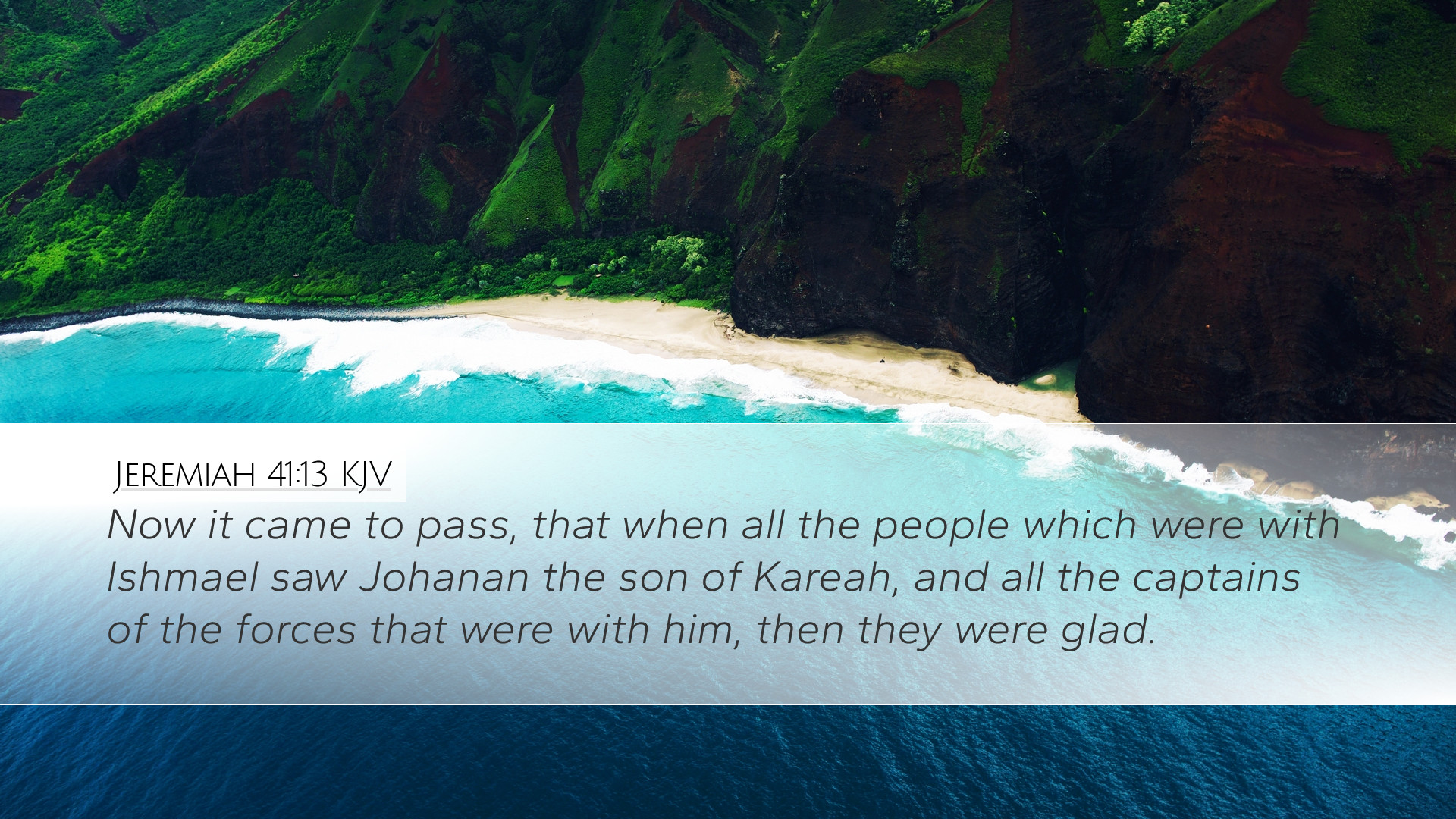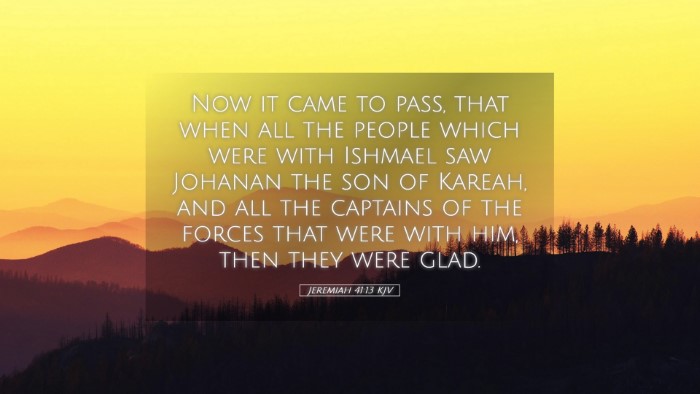Commentary on Jeremiah 41:13
Jeremiah 41:13 states: "But when they were come into the midst of the city, all the captains of the forces which were in the fields came, and took them, and brought them unto the captain of the guard." This verse occurs in a significant context, as it captures a moment of tension and aftermath following the assassination of Gedaliah, the appointed governor of Judah. This commentary seeks to unpack the implications and insights derived from this text using insights from notable public domain commentaries.
Contextual Overview
The immediate context of Jeremiah 41 reveals the chaos following the Babylonian conquest and the subsequent leadership vacuum created by Gedaliah's assassination. His murder led to an atmosphere of fear and uncertainty, impacting both the remnant of Judah and the surrounding regions. The details in this verse underscore the fragmentation of leadership and the distressing conditions faced by the Jewish populace.
Historical Insights
This verse marks a critical juncture in Judean history, revealing the complexities of human leadership during times of national crisis. As noted by Matthew Henry, Gedaliah's appointment was to offer some stability to the Jewish people after the Babylonian exile; however, his violent end demonstrates the perilous nature of political dynamics in a besieged nation. The arrival of the captains signifies a collective response to the destabilization of their society.
Character Analysis
- The Captains of the Forces: The actions of the captains illustrate a response driven by the need for security and direction following the chaos. Albert Barnes emphasizes that these leaders were likely torn between their loyalty to Gedaliah and their instinct for self-preservation amidst shifting allegiances.
- The Captain of the Guard: He serves as a figure representing imposition of authority over a fractured society. His role signifies both protection and oppression, bringing to light the ambiguous moral terrain of leadership during periods of conflict.
Thematic Reflections
Several themes emerge from this verse, relevant for contemporary theological reflection:
Leadership and Accountability
The capture and bringing forth of the captains to face the captain of the guard signify the moral weight of leadership. Adam Clarke highlights the need for leaders to be held accountable for the well-being of their people. The aftermath of Gedaliah's death provides a stark reminder of how the failure of one party can lead to repercussions for the wider community.
Fear and Uncertainty
With Gedaliah's death, fear permeated the people of Judah. Matthew Henry articulates that fear often leads to rash decisions and the breakdown of trust among communities. The collective anxiety experienced by the captains and the citizens reflects a timeless human experience during crises.
Divine Sovereignty in Human Affairs
Notably, the events of this chapter invite reflection on God’s sovereignty amidst human rebellion and chaos. The captains' actions are seen not just from a human perspective but also through the lens of God’s unfolding plan for His people. This commentary reveals that despite the upheaval, God's purposes remain intact, directing history—even when circumstances appear bleak.
Devotional Applications
This passage invites pastors, students, and theologians to consider several devotional implications:
- The Importance of Seeking Godly Leadership: As the aftermath of instability demonstrates, the search for godly leaders is paramount in guiding communities through turmoil.
- Endurance in Trials: The experience of fear and uncertainty should lead believers to a deeper trust in divine providence, recognizing that through trials, God is constantly at work.
- The Challenge of Accountability: Each leader and follower must assess their roles and responsibilities within their communities, understanding that their actions have broader consequences.
Conclusion
Jeremiah 41:13 encapsulates a pivotal moment in Judah's history. The insights gathered from public domain commentaries reflect a deep understanding of the tragic dimensions of leadership amid chaos, the necessity for accountability, and God’s inscrutable plans in times of distress. As we meditate on this text, may we glean wisdom not only for our understanding of history but also for our present-day faith journeys. In the face of uncertainty, let us seek the Lord earnestly, trusting His guidance and sovereignty amidst human struggles.


